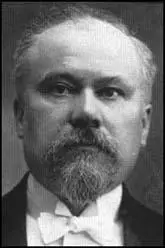Raymond Poincare

Raymond Poincare, the son of an engineer, was born in Bar-le-Duc, France, on 20th August, 1860. After graduating from the University of Paris he became a lawyer in 1882.
Poincare was elected to the Chamber of Deputies in 1887 and six years later became France's youngest ever minister when he was placed in charge of education (1893-94). He also served as minister of finance (1894-95) before once again becoming minister of education (1895).
In 1903 Poincare left the Chamber of Deputies to concentrate on his private law practice. He did serve in the Senate and in 1906 agreed to become minister of finance.
Poincare was appointed head a coalition government in January 1912. He also served as foreign minister and concerned about the growth of German militarism played an active role in strengthening the Triple Entente. This led him to be criticized by the left as a warmonger.
In January 1913, Poincare defeated Georges Clemenceau to become president of France. During the First World War Poincare tried hard to preserve national unity. However Poincare found it difficult working with Clemenceau who became prime minister in 1917.
Poincare returned to the Senate after his presidential term came to an end in February 1920. A supporter of the war guilt clause in the Versailles Peace Treaty he served as chairman of the reparations commission.
Poincare returned to power as prime minister in January 1922. He refused to accept a delay in reparation payments and in January 1923 ordered the French Army into the Ruhr.
Defeated by the left in the elections held in 1924 Poincare was replaced by Edouard Herriot as prime minister. However, he once again was brought back to power in July, 1926 and served as both prime minister and minister of finance. France enjoyed economic prosperity during this term of office and he was a popular leader until ill-health forced him to resign in July 1929. Raymond Poincare died in Paris on 15th October, 1934.
